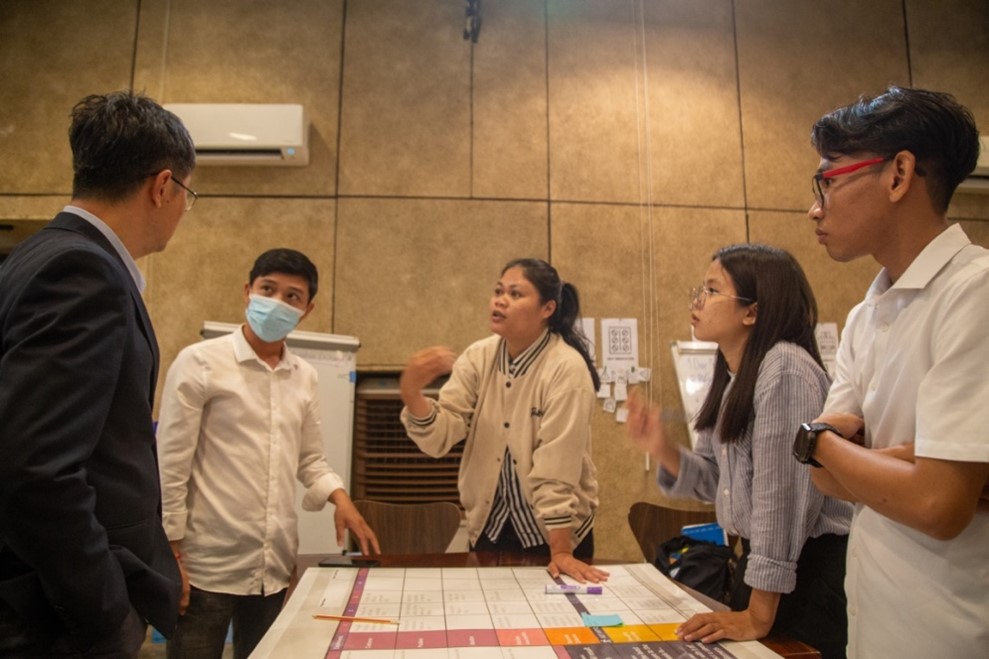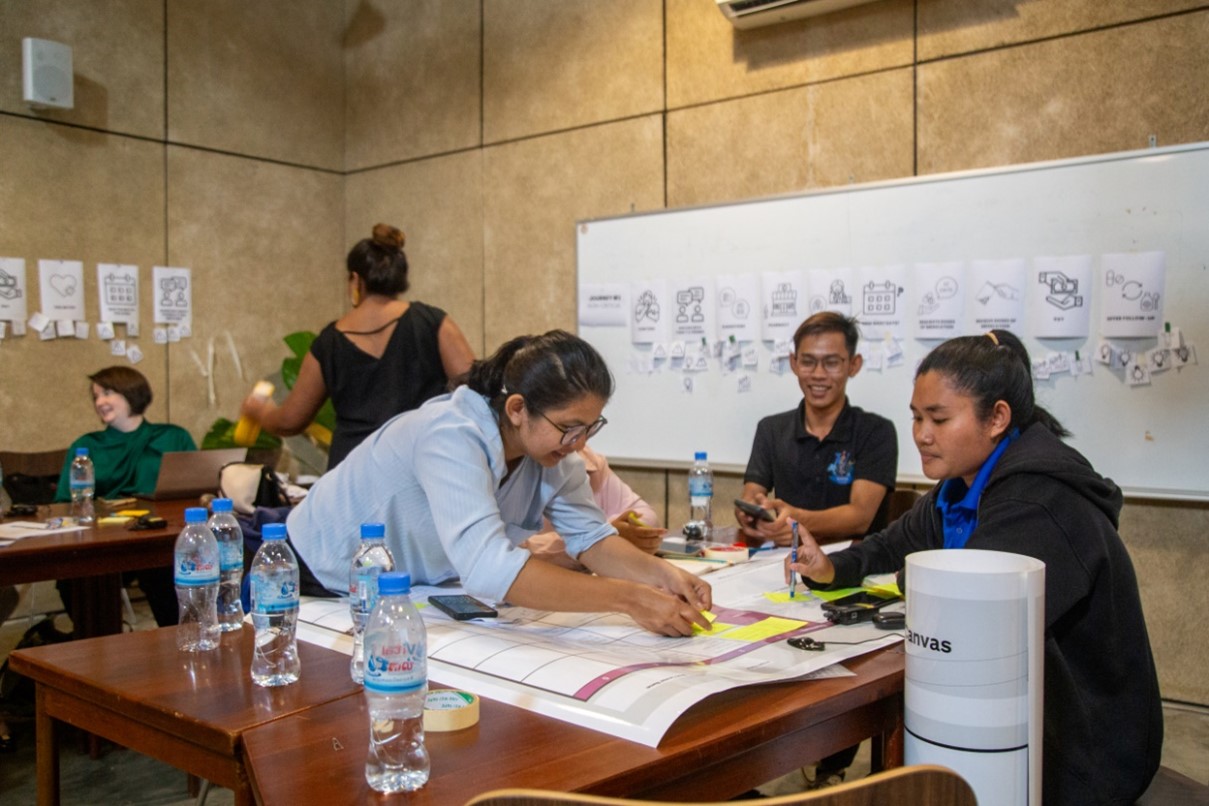In Cambodia, the misuse and overuse of antimicrobials is leading to antimicrobial resistance (AMR), weakening the power of medicines. AMR happens when bacteria, viruses, fungi and parasites no longer respond to antimicrobial agents such as antibiotics, making infections harder to treat and increasing the risk of disease spread, severe illness and death. AMR is no longer a “silent pandemic” but is a significant public health threat that is expected to cause 5.2 million deaths and cost US$ 148 billion in prolonged hospitalizations and lost productivity in the Western Pacific Region between 2020 and 2030.
Major contributions to the misuse and overuse of antibiotics in Cambodia1 includes non-prescription use, particularly for respiratory infections and diarrhoea in children, and limited control on antibiotic sales. Understanding that old tools and methods were not enough to raise awareness and inspire sufficient action to fight AMR, the World Health Organization (WHO) partnered with the Cambodian Ministry of Health, the Ministry of Environment, and the Ministry of Agriculture, Forestry and Fisheries to introduce new ways of thinking about the problem.
The Innovation Hackathon to Raise Awareness of AMR in Cambodia was held in August 2023 and was the first in the Western Pacific Region. Its aim was to provide 20 university students with the knowledge and tools to develop innovative behavioural change communication campaigns. This new initiative was designed to cultivate AMR champions in youth and young adults, who dominate social media and are experts at using new technologies to make their voices heard.
Even before Peung Keanseng took part in the hackathon, the 20-year-old knew about the problem of AMR from his microbiology classes at the University of Puthisastra.
“I acquired extensive knowledge about bacteria, including their mechanisms of developing resistance to substances, their impact on health and the synthesis of antimicrobial drugs,” says Mr Peung. But AMR seemed impossible to solve.
“My findings revealed numerous areas of concern, including the impact of AMR on agriculture and health-care systems. It's a sad reality that these problems are all interconnected and can have devastating consequences on our collective health.
“I felt helpless and powerless to effect change.”

A group of students discuss their plan for an idea validation experiment with their designated mentor, Kelvin Tan (left), a temporary advisor to WHO. © WHO/Shunsuke Miyatake
At the hackathon, participants learned how knowledge, beliefs, emotions and the environment drive behaviour. Using a sprint-style tool, “hackers” in five teams identified a target audience and problem. They developed solutions that they tested with audiences in ‘get out of the building’ exercises where they interviewed people at different locations across the city.
At the end of the three days, a winning team was announced, and its idea will be turned into reality in collaboration with a media company, disseminated through social media platforms and other channels, and evaluated for effectiveness.
The hackathon’s methods were new to Mr Peung, who was a member of the winning team.
“I discovered problem-solving techniques which were entirely new to me. The best part was working alongside my teammates and collaborating with other teams to exchange ideas and perspectives. It was inspiring to see how diverse perspectives could be combined to create something truly innovative.”
His teammate, Poek Leakhena, 21, a bioengineering student at the Royal University of Phnom Penh, describes the research that went into her team’s winning project, called ‘Together Against AMR’.
“We assumed that the main problem was that people were not aware of AMR; that's why they overuse or misuse medications. After a survey, we found most Cambodian citizens missed information about AMR. So, our assumption was right. If people understand more, we can avoid AMR and they will live a healthy life,” she said.
The ‘Together Against AMR’ team’s winning idea is based on the insight that Cambodians deeply care about future generations. Judges said they appreciated its bold slogan – “Don't save yourself by killing every generation”.

Participants brainstorm about a creative communication campaign after learning about contributors to AMR and a behavioural science framework. © WHO/Shunsuke Miyatake
Another member of the winning team, Chao Tha Chea Buthra, 19, who is also studying science research at the University of Puthisastra, was chosen by the organizers to pitch his team’s solution in Manila, the Philippines, during World AMR Awareness Week (WAAW) 2023.
The hackathon made a lasting impression on Mr Chao.
“Since the hackathon, I have actively taken steps to raise awareness about AMR by engaging in conversations with my family and friends.
“By discussing the implications of AMR and emphasizing the significance of not sharing medications, I hope that the people of Cambodia gain access to this vital information as soon as possible.”
Other participants were also more likely to share information with family and friends after the hackathon, according to monitoring, evaluation and learning (MEL) of the hackathon, which is in line with WHO’s Communication for Health (C4H) approach. Overall, the event raised participants' concern about AMR, and reinforced a belief in individual responsibility for addressing AMR. Half of all participants said they would become AMR champions.
Acting WHO Representative in Cambodia Dr Pascal Ringwald said, “Preventing AMR requires collective action from all sectors of society. We need a whole-of-society and multi-sectoral approach to tackle this global issue effectively, and it makes sense that young people will lead the way. Our job is to support them in their efforts.”
WHO’s Western Pacific Region supported a subsequent hackathon in Singapore, and other countries across the region are set to follow in 2024.
-----------------------------------------------------------
1 Jane Mingjie Lim, Pheak Chhoun, Sovannary Tuot, Chhorvoin Om, Sidonn Krang, Sovann Ly, Li Yang Hsu, Siyan Yi, Clarence C Tam, Public knowledge, attitudes and practices surrounding antibiotic use and resistance in Cambodia, JAC-Antimicrobial Resistance, Volume 3, Issue 1, March 2021, dlaa115, https://doi.org/10.1093/jacamr/dlaa115




